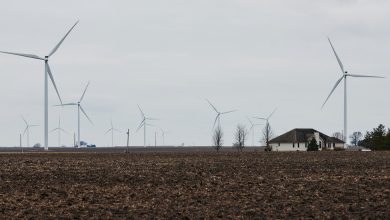Biden Administration Restores Bird Protections, Repealing Trump Rule

WASHINGTON — The Biden administration on Wednesday restored protections for migratory birds that were loosened under former President Donald J. Trump, a move celebrated by conservationists but expected to exacerbate tensions between the administration and the oil and gas industry.
The move comes as some bird species have been disappearing from the planet. North America has lost almost three billion birds in the past 50 years, scientists said. In addition to suffering from habitat loss and climate change, they are killed by collisions with buildings, power lines and communication towers. They die in oil waste pits and oil spills.
Deb Haaland, the secretary of the Department of Interior, said the agency will formally revoke a rule enacted in the waning days of the Trump presidency that shielded businesses, landowners and others from legal consequences if their activities unintentionally killed birds.
That meant a construction crew that knocked down a barn with owl nests, or an oil company responsible for a catastrophic spill that killed thousands of birds, could not be punished.
Instead, the Biden administration will return to a longstanding interpretation of the 1918 Migratory Bird Treaty Act that prohibits “incidental” harm to birds, Ms. Haaland said. She said reinstating federal protections is a critical step because while some industries have taken voluntary measures to protect birds, populations are still declining.
The losses are part of a growing global biodiversity crisis — driven by habitat loss, climate change and other human activities — that puts a million species at risk of extinction. Earlier on Wednesday, the U.S. Fish and Wildlife Service proposed removing 22 animals and one plant from the endangered species list because they have gone extinct. One, the Bachman’s warbler, was a migratory songbird that hasn’t been seen since 1988.
“This moment, as sobering as it is, can serve as a wake up call,” Ms. Haaland said during a call with journalists. “Our children and grandchildren will not know the Earth as we do unless we change the status quo.”
But restoring protections that were lost under former President Trump are not enough, said Erik Schneider, policy manager at the National Audubon Society. He wants the Biden administration go beyond the new regulation.
“We also need a governmentwide effort to significantly ramp up bird conservation efforts if we’re going to bring back three billion birds and protect birds from climate change,” he said.
Oil industry representatives, who have been at odds with the Biden administration over separate efforts to curtail fossil fuel leasing on public lands, denounced the regulation and said the agency was singling them out for causing harm. The overwhelming majority of prosecutions under the law have been against energy companies.
“This rule takes us back to a time when federal agencies selectively prosecuted oil and natural gas companies,” Kathleen Sgamma, president of the Western Energy Alliance, an association of independent oil and gas firms, wrote in an email. She declared the new rule “legally vulnerable.”
The Migratory Bird Treaty Act was enacted to protect the birds from over-hunting and poaching at a time when feathers from the snowy egret were in such high demand for hat adornments that the bird was nearly hunted to extinction. It makes it illegal “by any means or in any manner” to hunt, take, capture or kill birds, nests or eggs from listed species without a permit.
Beginning in the 1970s, federal officials used the act to prosecute and fine companies up to $15,000 per bird for accidental deaths on power lines, cellphone towers, wind turbines or other industrial hazards.
In 2010, the Deepwater Horizon disaster killed 11 people and spewed more than 210 million gallons of oil into the Gulf of Mexico. Hundreds of thousands of birds were killed, and BP agreed to pay $100 million for criminal violations under the Migratory Bird Treaty Act.
In 2017 the Trump administration reinterpreted the law, protecting companies from liability unless they knowingly and intentionally sought to kill birds. A final regulation was issued just days before Mr. Trump left office despite a blistering ruling from a federal judge, who struck down the policy in response to a legal challenge from eight state attorneys general and a coalition of environmental groups.
The revocation of Mr. Trump’s rule will go into effect in 60 days from October 4th. In addition, the Interior Department said it will take comments on a possible new permitting system so that some companies are not penalized if birds are killed or injured despite reasonable precautions in the course of doing business.





